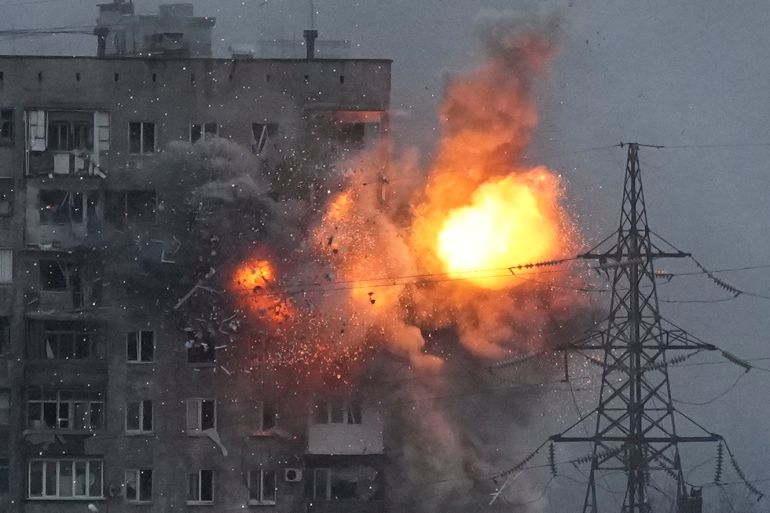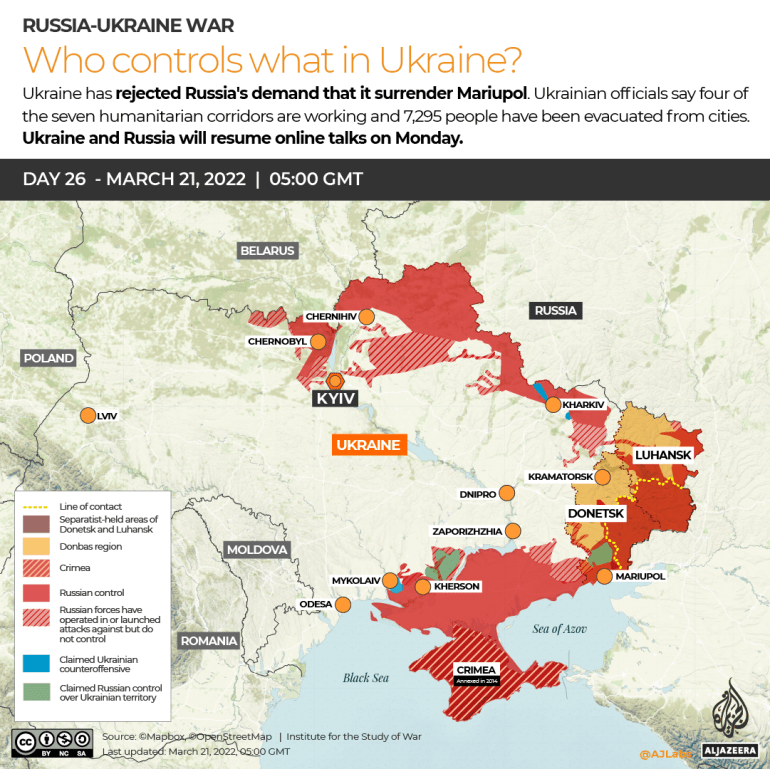Russia-Ukraine: How will the war end?
What would a de-escalation or an end to the war look like, and what would it mean for the two countries?

As the human and economic toll of the war in Ukraine mounts, efforts to reach a negotiated settlement have intensified.
Over the weekend, Turkish Foreign Minister Mevlüt Çavuşoğlu, who last week travelled to Moscow and Kyiv, expressed optimism about the progress of negotiations between Russian and Ukrainian officials. In an interview to Turkish daily Hürriyet, he said there was “convergence on the two countries’ positions on the critical issues”.
Keep reading
list of 4 itemsRussia doesn’t have capability to knock Ukraine out of war: Ex-US commander
Russia-Ukraine war: List of key events, day 785
Poland arrests man over suspected plan to kill Zelenskyy
On Saturday, Ukrainian President Volodymyr Zelenskyy called for direct talks with his Russian counterpart, Vladimir Putin, who has continued to receive phone calls from world leaders urging him to consider a ceasefire. The European Union has also urged China to step in as a mediator.
According to the United Nations, at least 902 civilians have been killed and 1,459 wounded since the war began on February 24 – but the real toll is believed to be much higher. Military deaths appear to be in the thousands, although no independently verified data has been available. Some 10 million Ukrainians have been forced to leave their homes, including more than three million who have fled the country.
Meanwhile, the World Food Programme has warned that the war could cause a surge in hunger and malnutrition across the world, as Russia and Ukraine produce about 30 percent of the global wheat yield and more than half of the global supply of sunflower oil.
With the cost of war rising for Russia and Ukraine, as well as for the world, it is in the interest of both parties for a deal to be reached as soon as possible, experts say. But what would a de-escalation or an end to the war look like, and what would it mean for the two countries?

A settlement in the short or long term
Since the launch of the Russian invasion of Ukraine, a number of scenarios have been raised to predict its outcome. By now, some have appeared more likely than others.
The blitzkrieg that would have triggered the collapse of the Ukrainian army and government that Moscow had hoped for in the first days did not materialise. Likewise, fears of a possible nuclear war after Putin ordered nuclear forces to be on high alert on February 28 have also somewhat diminished.
NATO’s clear declaration that it would not get involved in the conflict, either by deploying troops or establishing a no-fly zone over Ukraine, has also made another scenario unlikely: an outright military defeat for Russia.
Thus, the war seems to be heading towards two more probable outcomes: some form of a peace settlement or a protracted conflict.
Recent reports have indicated that there has been softening of positions on both sides. On March 15, Zelenskyy said he would not press for NATO membership, but insisted on strong security guarantees for Ukraine from the West.
According to Çavuşoğlu, the Ukrainian government also appears open to negotiating disarmament and the status of the Russian language in Ukraine, which are part of Moscow’s demands. A “de-Nazification” process that would see Ukraine banning certain far-right groups is also being discussed.
However, agreement on another point – the status of Crimea, which Russia annexed in 2014, and the Donbas region, where Ukrainian armed forces and Russian-backed separatists have been fighting for eight years – seems to be more challenging. For both Putin and Zelenskyy, concession on this issue would incur severe political costs or amount to capitulation, which both want to avoid for their political survival. On Monday, Kremlin spokesman Dmitry Peskov ruled out a meeting between the two presidents until there was a prior agreement on all issues.
According to Tatiana Stanovaya, a nonresident scholar at the Carnegie Moscow Center and founder of R.Politik, even if there is a breakthrough and some form of an agreement is signed, its implementation is not guaranteed.
“I don’t see how Russia would agree to withdraw its army until all conditions are met. [It is also questionable] how quickly Zelenskyy would be able to fulfil them, to what extent the Ukrainian elite would be ready to accept them, and the society as well, which now believes is winning the war,” she said.
In Stanovaya’s view, as long as a deal is not concluded and fully carried out, Russia would continue to escalate militarily against Ukraine, causing more damage to Ukrainian cities and pushing the country towards a humanitarian catastrophe.
Mark Galeotti, director of the consultancy Mayak Intelligence and senior associate fellow of RUSI, said failure to strike a viable agreement in the short term could lead to a protracted war. “It would be an ongoing war fought at a much lower tempo than at the moment,” he told Al Jazeera.
Both Galeotti and Stanovaya, however, agree that a “Syrian scenario”, in which the war continues for years, is unlikely given a number of factors.
First, the punishing Western sanctions on Russia would erode its ability to maintain a prolonged military presence in Ukraine, which is already resulting in significant military personnel losses and an estimated financial cost of tens of millions of dollars per day. Second, it would have trouble maintaining control over occupied territories, where the population remains loyal to Kyiv. And third, Western economic and military support for the Ukrainian army could reinforce Ukrainian resistance and make any future Russian advances quite difficult.
Post-war Ukraine
Regardless of whether Russia and Ukraine manage to reach a deal soon or not, both countries are likely to undergo radical change – even in the most optimistic scenarios.
Ukraine’s economy has already been heavily damaged by the war, with a massive outflow of capital starting even before the invasion. According to Ukrainian Finance Minister Serhiy Marchenko, some 30 percent of economic activity has shut down, while the International Monetary Fund estimates that the Ukrainian economy could shrink by up to 35 percent this year. Vital infrastructure, including roads, railways, and bridges have been damaged, and a number of port facilities on the Black Sea are under Russian control.
In response to Ukraine’s economic hardship, the West has extended significant funding, including $1.1bn for military aid and $1.3bn in emergency micro-financial assistance from the EU and $6.9bn in financial aid and $3.5bn for weapons purchases from the United States.
On February 28, Zelenskyy signed a formal request for Ukraine’s membership to the EU, but Brussels warned that no exceptions could be made for Kyiv and accession could take years.
According to Volodymyr Ishchenko, a research associate at the Institute of East European Studies at Freie Universität Berlin, EU membership, strong financial assistance and Russian withdrawal would be the best-case scenario for Ukraine. It would encourage Ukrainians to accept possible painful concessions as part of any peace agreement and keep the ultranationalistic forces at bay.
Even if Ukraine is given strong guarantees for EU membership, it would still undergo a difficult transition as a result of the war. Anti-Russian sentiment would dominate the social and political sphere and would drive a homogenisation of Ukrainian identity and marginalisation of certain political views, Ishchenko said.
On Sunday, Zelenskyy banned 11 parties over alleged links to Russia, including the biggest opposition formation in parliament.
Other scenarios could have an even more devastating effect on Ukrainian society, including continuing war that would allow the far-right movement to take over military or state institutions. Russia’s refusal to withdraw its forces could result in the partition of the country and the installation of a puppet government.
“In the [occupied areas], the political regime would be very repressive, perhaps one of the most repressive in the post-Soviet space because it would be seen as illegitimate,” Ishchenko said. “[Ukrainian] resistance would inspire the opposition in Belarus and Russia and the occupation of Ukraine would be a destabilising factor for the whole post-Soviet space.”
Post-war Russia
Russia’s economy and society are also set to face significant consequences from the war.
According to estimates, the country’s gross domestic product (GDP) can shrink between eight percent and 15 percent this year, while inflation could hit 20 percent. The sanctions, meanwhile, have undermined Moscow’s ability to service its debt and resulted in a massive withdrawal of international companies from its market, raising fears of skyrocketing unemployment.
“It will take years for Russia to recover. It will take years to rebuild the Russian military. It will take more than that to rebuild the Russian economy,” Galeotti said.
To stem out opposition to the war, the Russian government has launched a crackdown on critical media outlets and dissent. The independent channel TV Rain and the liberal Echo of Moscow radio have been shut down, while more than 15,000 people have been arrested for protesting against the war.
In a March 16 speech, Putin branded war critics as “traitors” who were part of a “fifth column” and called for “self-cleansing” of the country. Fear of repression has driven many Russians out of the country since the start of the war, with some estimates putting the number of political emigrants as high as 200,000-300,000.
In Stanovaya’s view, the war has had a detrimental effect on Russian politics and society and a peace deal with Ukraine would not reverse it.
According to Ishchenko, in the long run, the Kremlin will have to adopt a different political and economic model.
“The dictatorial measures will not be sufficient to retain power … and at some point, the Russian government would need to start buying the loyalty of Russian citizens or subjugated Ukrainians, Belarusians with a more Keynesian redistributionist economic policy.”
Politics will also have to be reorganised to pave the way for the establishment of a party with a mass membership, able to rally the population around Putin’s figure and imperialist ideology, Ishchenko said.
“It would not look exactly like fascism but the regime would be more mobilisationist,” he added.
You can follow Mariya Petkova on Twitter @mkpetkova